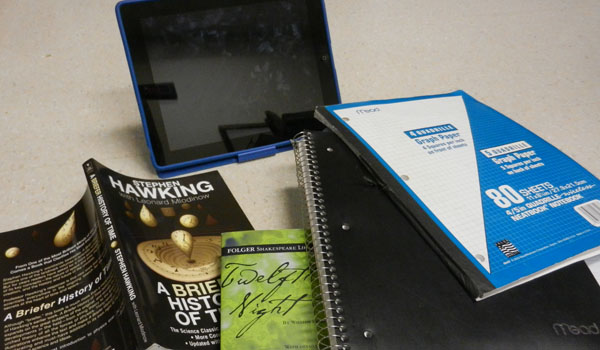With midterms just around the corner, everyone is surely stressing about those big tests. And if you aren’t, you either really know what you’re doing, or you really don’t.
So I’ve talked to a few experienced students and teachers for the things that work and the things that don’t when it comes to preparing for exams.
“Flashcards are golden,” says Junior Leighton Lazaro, and she says the best place for her to study is in a room at home with good natural light.
“Where I can hear like a little bit of the natural noises and sounds that goes on in my house but not too much to distract me,” she adds.
She suggests taking small breaks after about 30-45 minutes of studying, and that listening to music without lyrics can be great. You should also be studying a little bit in the days leading up to the tests, not just the day of, “and take your studying material with you to school so you can review in your free time, even if its only like three minutes after a test or something.”
Try not to overexert yourself, but if you have free time for a quick review, do it and save yourself some stress later! Most students have a favorite brain foods that they like, cinnamon, chocolate, or potatoes, etc. But Leighton says having a spoonful of peanut butter right before studying helps her.
And prioritize your focus. You know you have your English and Math exam Tuesday? Spend the most time on those on Sunday and Monday. Then do the same for your Wednesday and Thursday exams. We have a half day on all the midterm days, so take advantage of them to put time you would normally spend in class, sports, or doing other homework to study–but with the extra time to pace yourself.
Mr. Ducote says that his students should study by reading through their notes and rewriting important concepts until they can remember.
“I generally do not want my students to ‘memorize’ things, and I would prefer they ‘learn’ them, but there is a base level where certain critical facts just need to be known.”
He says that when going through problems, students should ask for help if they come across a problem that they cannot understand on their own – don’t just skip over it.
“The one thing I would say is that practice doesn’t necessarily make perfect. Practice makes permanent. If you practice the wrong way to do something, you will likely solidify that wrong way to do it in your mind,” says Mr. Ducote. “So using caution and practicing well is just as important as doing the actual practicing…One misconception that a lot of students tend to have in general is that ‘there will be time tomorrow.’ I must admit that I often think that this statement is true when it simply is not. Working on studies promptly is more beneficial that I can put into words.”
“The best tip I can give students is make a study plan and stick to it.” says Ms. Guichard, a second year teacher at Ascension. “Midterm week will be a week full of comprehensive tests, and it will seem impossible to study for six different subjects in one weekend. To minimize stress, it is important to write out what subject you will study on what day for ‘x’ amount of hours. Make sure to include in that schedule study breaks. These breaks should consist of moderate exercise or eating a healthy meal. It should not include staying out late with friends or turning on Netflix. In fact pretend Netflix does not exist until midterms are over. ‘Just one more episode’ turns into four seasons of The Walking Dead or Games of Thrones real quick.”
When asked for a myth about studying that she found didn’t work, she said, “Telling a teacher, ‘My dog ate my study guide’ does not work. Most professors I had in college were weird dog lovers. You know the kind of people that don’t have children of their own, so their pets are angels and would never do such a terrible thing. In fact, their dogs help them with their homework.” (See the slide show for an example.)
As far as things NOT to do, we can probably all agree on this one: “Failed study attempts include studying with a group,” says Leighton. “I get off topic. I wanna talk to them instead of study. I tend to cram the night before, and that seems to work for me, but it can be stressful at times.”
And something that might be common knowledge, but we probably all need a reminder: “The weekend before midterms, don’t schedule anyyyyything,” suggests Leighton. “This doesn’t mean study non-stop all weekend, but def study everyday several times a day. If you don’t schedule anything, you’re so bored you have to study.”

